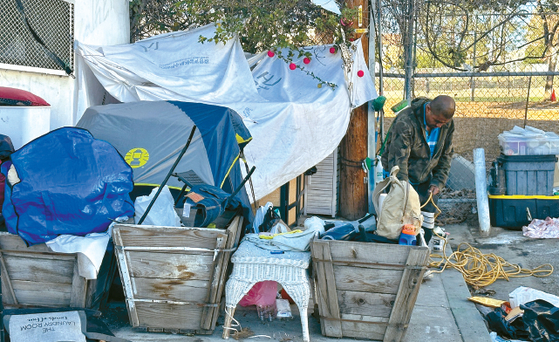Good morning! It’s Monday, November 27. We hope our readers had a happy Thanksgiving holiday. Welcome to Katchup Briefing, the Korea Daily’s weekly English newsletter, where I’ll keep you informed with the latest news updates and perspectives from the Korean American community. If you want to explore more articles and columns from previous weeks, please visit koreadailyus.com.

I live in an apartment in Downtown LA and take the bus to work in Koreatown. I’ve been living in Downtown LA and working in Koreatown for nine months now, but there are still some things with which I don’t feel comfortable: trash and homelessness.
The bus stop where I wait for my morning commute is always messy, with piles of trash. This is because homeless people rummage through the trash looking for food, cans, and plastic bottles to exchange for money. Bus stops on the way to work are usually littered with trash, and there are always homeless people lying around. The area around MacArthur Park, situated in the middle of bus routes, is a mess of trash and homelessness.
When I complain about this, I am advised to move to the suburbs and drive to work. I’m told to leave because the issues of trash and homelessness in Downtown and Koreatown cannot be solved anytime soon.
However, there are many reasons why leaving Downtown and Koreatown for the suburbs is difficult. And isn’t it a basic need for residents to live in a clean and safe environment? Why should they have to put up with the filth and unsafe conditions caused by homelessness?
Fed up, residents took action. More than 170 residents and shop owners in LA’s Koreatown petitioned their neighborhood council to address homelessness to ensure a clean and safe living environment.
On November 17, the residents petitioned the Wilshire Center-Koreatown Neighborhood Council to remove homeless encampments near Seoul International Park and Robert F. Kennedy (RFK) Inspiration Park.
Near the intersection of Olympic Boulevard and Irolo Street, south of Seoul International Park, shop owners have complained that the homeless population is causing serious safety and sanitation issues.
At another location, RFK Inspiration Park, which borders RFK Community School, about ten homeless people have formed a tent camp and are committing various crimes, neighbors say.
“The park has long been a homeless encampment,” they noted, citing safety and sanitation issues, including recent shootings, violence, arson, graffiti, and urination and defecation on buildings. “We’ve complained to the police, the parks department, and the school, but to no avail, and we’ve been ignored repeatedly. It is the goal of the residents to close the park.”
Mark Lee, the neighborhood council chairman, who received the petition, said, “We plan to submit the petition to the 10th District Councilmember’s office, the LAPD, the LA Unified School District, and the LA City Bureau of Sanitation.”
“On average, we receive nearly ten homeless complaints per month,” Lee said. “And even when residents report them to the police, the city’s strict regulations on homelessness make it difficult to enforce.”
When Mayor Karen Bass took office last year, she declared a homelessness emergency, pledging to get all 17,000 homeless people off the streets within a year.
According to data provided by the mayor’s office in early November, a total of 18,792 people have been housed in transitional housing through various temporary programs, including Inside Safe. According to data released by City Hall in late September, the cost of homelessness relief has totaled $81.2 million this year.
Shouldn’t all homeless people be in temporary shelters and off the streets by now? However, there are more homeless camps in Koreatown, so I’m uncertain what this means. It could mean that they were housed in temporary shelters and then returned to the streets, or it could mean that there are more new homeless people. They must have refused relief programs
If homeless people insist on living in tents on the streets, I would like to see effective policies implemented, such as relocating them to places with amenities like water, electricity, and toilets that do not harm the living conditions of existing residents.
By Mooyoung Lee lee.mooyoung@koreadaily.com

![Asian Voters’ Support for Trump Rose to 40%, Pew Survey Shows U.S. President Donald Trump delivers an address to the nation accompanied by U.S. Vice President JD Vance, U.S. Secretary of State Marco Rubio and U.S. Defense Secretary Pete Hegseth, at the White House in Washington, D.C., U.S. June 21, 2025. [REUTERS]](https://www.koreadailyus.com/wp-content/uploads/2025/06/0626-Trump-100x70.jpg)


![Korean Woman Deported After Using Altered Passport Name Old and new Korean passport [JoongAng Photo]](https://www.koreadailyus.com/wp-content/uploads/2025/06/0630-passport-100x70.jpg)